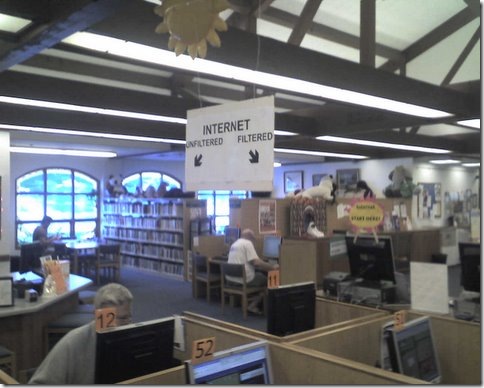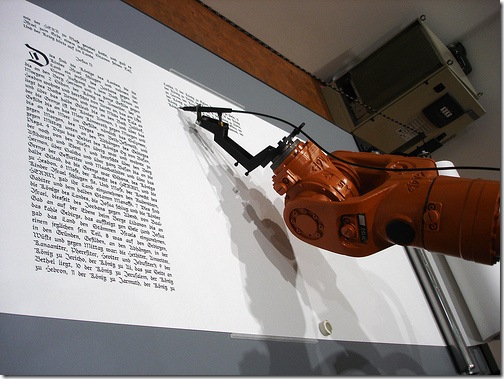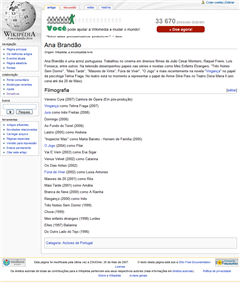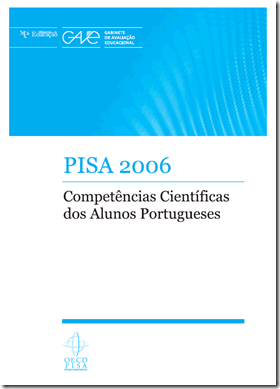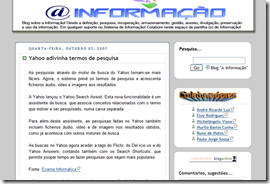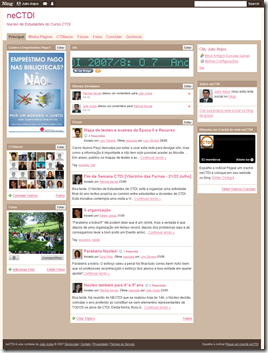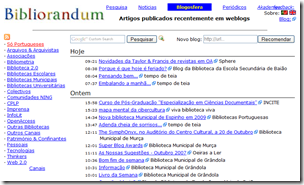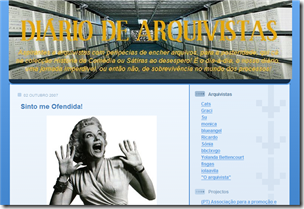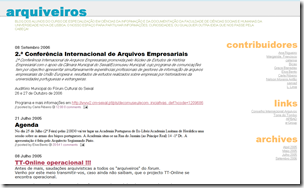-Memo of a presentation at the 2007 edition of the Internet Librarian International conference held in London (UK), October 8th and 9th, at the Copthorne Tara Hotel, by Júlio Anjos, Member of the Executive Board of INCITE: Portuguese Association for Information Management (est. 1985).
Question: Is “Biblioteca 2.0” different from “Library 2.0”?
I believe we can all assume that the “Library 2.0” phenomenon is not only trans-national, but also that Library 2.0 exists, and is needed (although it not always emerges where and whenever there is a need) to serve Patron 2.0, which I define as “He/She who is better served by the library with Web 2.0 tools”
Possible conclusion: Library 2.0 is unavoidable wherever Web 2.0 is a common user experience and worldvision.
Question: Is there a Library 2.0 phenomenon in Portugal, lets call it "Biblioteca 2.0"?
Being Portugal a developed country, with a very good standing among other developed countries in terms of access and use of Internet by broadband channels, what is the impact of the Web 2.0 phenomenon among Portuguese Information Professionals (a.k.a. Librarians) and Information Services (a.k.a. Libraries)? Did it generate the emergence of web 2.0 artifacts among Library and Information professionals and practices?
My own perception of the Portuguese Library 2.0 evolution in Portugal is that the answer is YES. Let’s look at the evolution of web 2.0:
- 2004
- No blogs by librarians
- One blog by an archivist
- One blog by an undergraduate LIS student
- Some “fora/BBS” experiments
- Some portuguese librarians cooperate and publish on Brazilian Blogs (Bibliotecários sem Fronteiras founded March 2002)
- 2005
- Some librarian authored blogs founded, some fully dedicated to LIS
- Late 2005: Seminal articles by Tim O’Reilly, emergence of Web 2.0 and Library 2.0 as insistent background noises and “solutions in search of problems”
- 2006
- Blogging is considered a risky activity by most professionals. Some full LIS blogging experiments in full swing.
- Late 2006: A librarian/scholar proposes to hold a round table of bloggers at the 2007 APBAD conference, and the proposal is accepted.
- 2007 (The year all hell broke loose!!!)
- April: APBAD
6 bloggers stand in front of a more than 150 librarians and archivists of all generations answering questions and giving testimony of each one’s experience

Complete success!!!
- May: CTDI’07
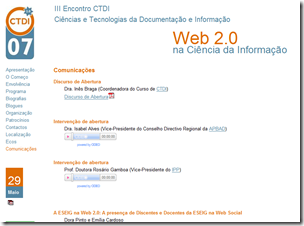
An annual, 1 day, conference organized by a LIS degree is dedicated to Web 2.0, 3 presentations from abroad, through Spype + WebEx (2 from UK, 1 from Brazil), 6 presentations by portuguese students, researchers, scholars, bloggers, practitioners. The event is blogged about, skypecasted, podcasted, etc …. The works! The event was organized by the students under supervision of some teachers
- September: EBLIDA-EUCLID’s Librarian@2010 meeting in Lisbon
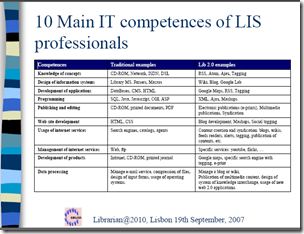
A Portuguese Librarian and a Spanish LIS Scholar call, on a joint presentation, for the rewording of the relevant EUROGUIDE LIS sections with web 2.0 nomenclature and tools. Incidentally it’s US ALA’s Keith Michael Fields who, among Rectors and Deans of several important European Universities, defends a faster integration of web 2.0 tools on the LIS curriculum and continuing education programs
Sidenote:
Is the urgency of adoption of the Library 2.0 attitude different between Europe and the US? I believe not: “Patron 2.0” is ubiquitous and depends on the penetration of internet in the society.
However, although the urgency is the same, the speed of adoption is not. Even in Portugal, the speed of adoption is very different between School Librarians and the remaining specialties: This seems to have been caused by the orientation of School Librarian’s training in Portugal, during 2007, which was focused on, and made use of, Web 2.0 tools. Result: from the 46 LIS Portuguese blogs (with activity in the month of October 2007) 16 are School Library Blogs (33%).
Current (October 2007) Portuguese Library 2.0 practices
Not all good… but then nobody’s perfect. We can definitively show examples of:
Librarian(s) 2.0
He/She who uses Web 2.0 tools to improve his/her ability to serve library patrons, IN WHATEVER environment
The most ancient, by a university librarian
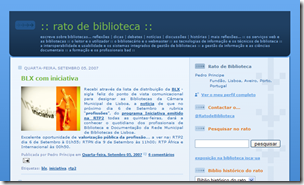 |
The most recent, by a public librarian
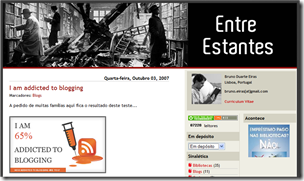 |
The funniest (teen and young adult services librarian)
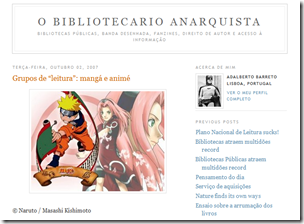 |
The most specialized by a mobile library driver, also a librarian
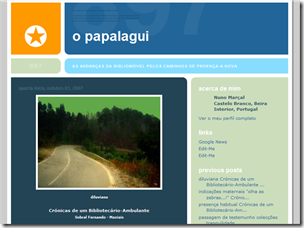 |
| |
|
Library(ies) 2.0
A Library which uses Web 2.0 tools to perform the library millennial mission of connecting content offers with content needs
A library using a blog because the official site looks like
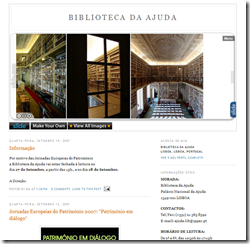 |
This:
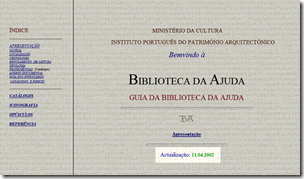
and isn’t updated since 2002 |
University Library
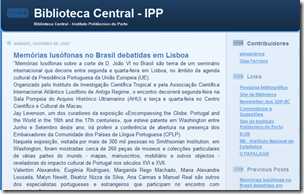 |
Public Library
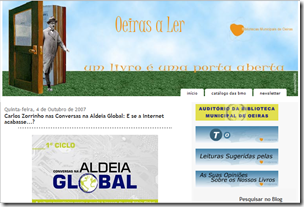 |
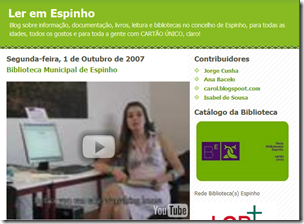
The unauthorized public library website |
|
LIS Degrees 2.0
Use of Web 2.0 tools to train the next generation of information professionals TOGETHER WITH competence development with Web 2.0 tools for latter practical implementation in the workplace (a library or a corporate information service).
Library Continuing Education 2.0
Developing competencies in Web 2.0 tools to the current workforce, at all levels possible.
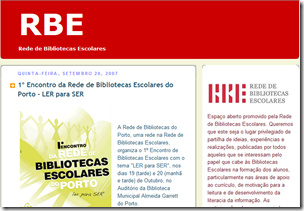
Scholl Libraries Network
Librarianship 2.0
Use of Web 2.0 tools to advance LIS as an object of research or as a tool for research
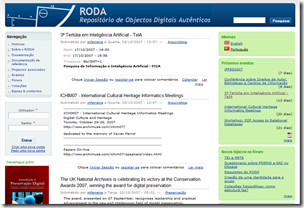
Digital Libraries and Archiving of digital artifacts
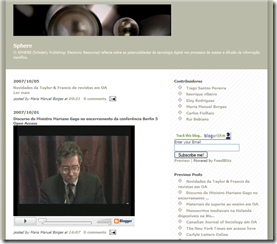
Open Access news
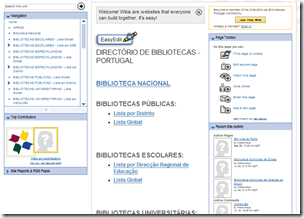
A library directory as a wiki
So…. is something missing?
Although it is possible to point at least one Portuguese example of almost every “Best Practice” imaginable… usually there is ONLY ONE example. In some aspects Portugal is behind every other Latin Country
Why? What’s missing?
-
Professional Association Guidance
-
APBAD (ALA equivalent):
A single one-week after-hours training in Lisbon in 2005. After the April 2007 congress no further action or position
-
APDIS (MLA equivalent)
No action or position known from the APDIS
-
INCITE (SLA equivalent)
Full support, but the smaller association
-
Updated Continued Training
-
Most practitioners think Library 2.0, and sometimes even Web 2.0, is just Blogs. Lots of confusion on the CTDI’07 meeting when wikis and podcasts declared web 2.0 tools.
-
INCITE will organize a localized version of 23things during the 2nd quarter 2008, open to practitioners, LIS students, LIS teachers, etc (affiliation with INCITE not a requirement)
-
LIS curricula
-
At the undergraduate level the students are forcing the matter:
-
Oporto Polytechnic Institute
-
Oporto University
-
Not so on the other undergraduate LIS degrees. But they have 1.0 curricula
-
At Master’s level, strangely, it’s the archivists who are more active with 2.0 tools
Conclusion and going forth
Recognising that the need for Library 2.0, due to the ubiquity of Patron 2.0, in itself a consequence of the ubiquity of Web 2.0, INCITE will
- Defend Web 2.0 in LIS curricula
- Practice Web 2.0 Advocacy
- Lead by practice:
